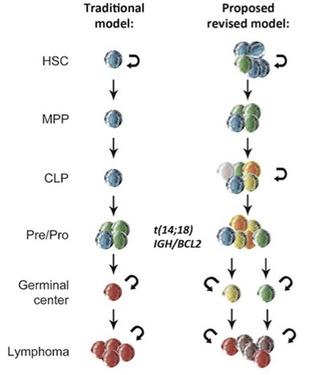A11 Contribution of somatic mutations in hematopoietic stem/progenitor cells to oncogenic evolution in follicular lymphoma
Patients with advanced follicular lymphoma (FL) are considered incurable due to the inevitable occurrence of relapses and treatment resistance. These originate from persisting common progenitor cells (CPCs) that harbor the hallmark translocation t(14;18) and a set of additional mutations. Our project will delineate the sequence and the hematopoietic differentiation stages of mutation acquisition. We will specifically address the evolving hypothesis, that specific mutations are acquired in hematopoietic stem and progenitor cells and contribute to clonal expansion of CPCs and oncogenic evolution in FL.

Figure Legend: Two models of oncogenic evolution in FL. In the traditional model (left), the BCL2 rearrangement (often by the translocation t(14;18)) is the initial event in an antigen naïve early B-lineage committed cell, and the remaining alterations develop within the germinal center and beyond. In the proposed model (right), the initial alterations are acquired within haematopoietic stem or progenitor cells that acquire additional alterations at multiple stages of differentiation. At some stages, the cells still have or gain self-renewal capacity (indicated by semicircular arrows) that promotes further clonal heterogeneity, as indicated by cells of multiple colors. Abbreviations: HSC, hematopoietic stem cell; MPP, multipotent progenitor; CLP, common lymphoid progenitor.

Dr. Oliver WeigertMedizinische Klinik und Poliklinik III, Ludwig-Maximilians-Universität München +49 (0)89 4400 4 3985 |

